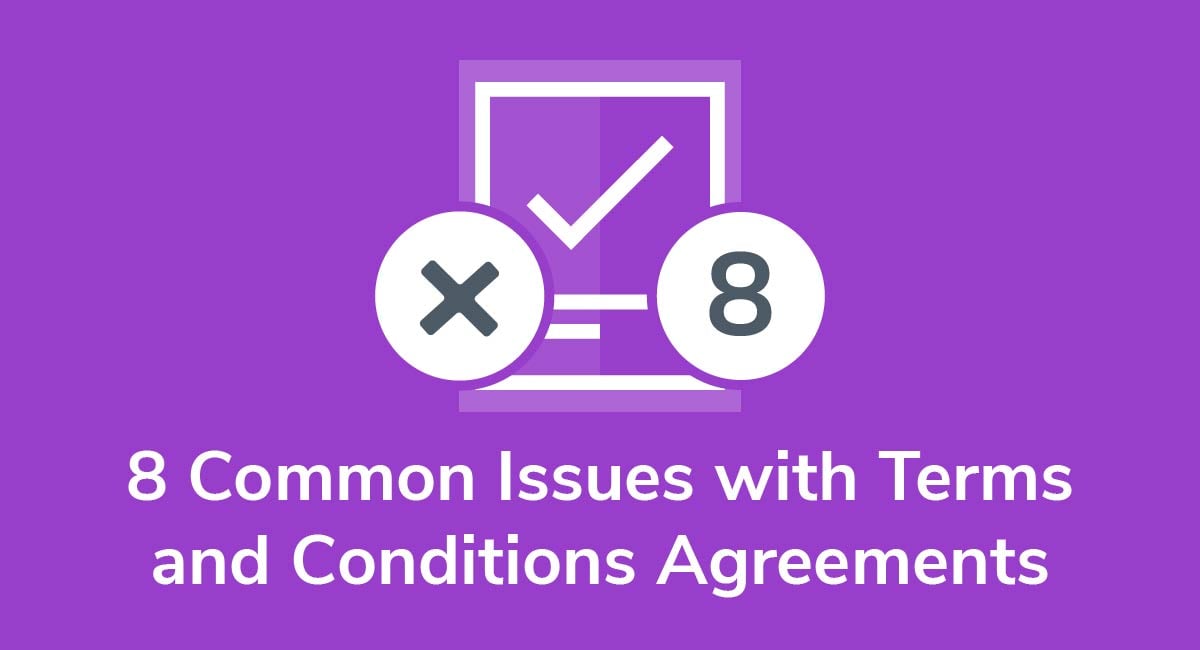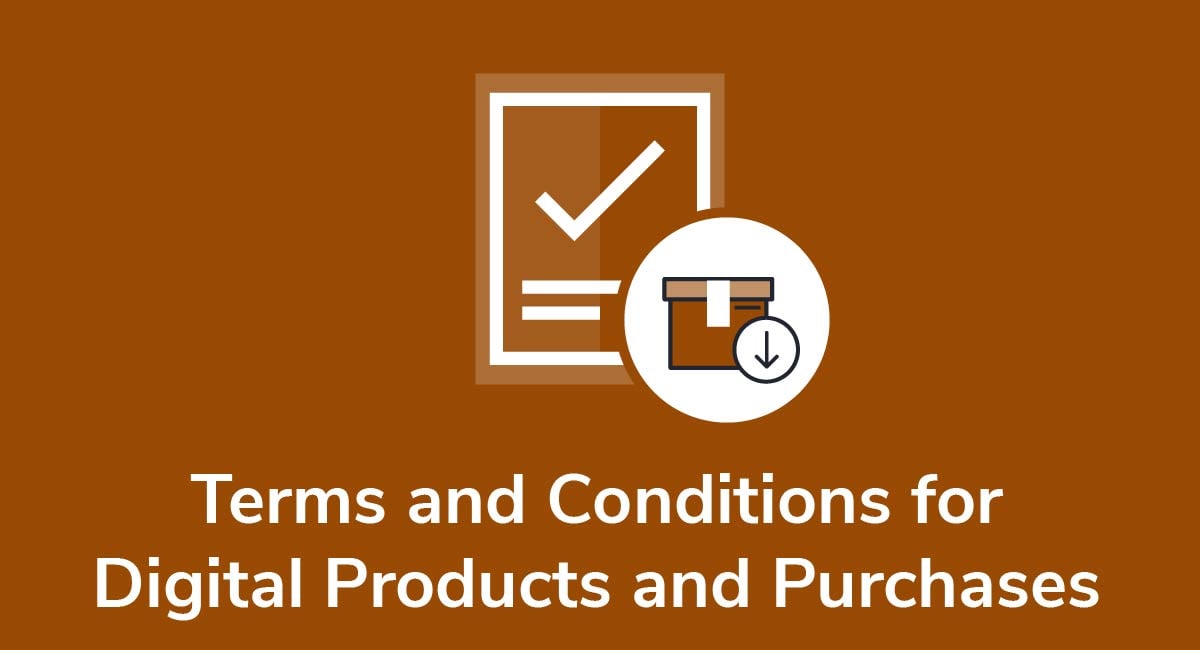Can I Copy Terms and Conditions?
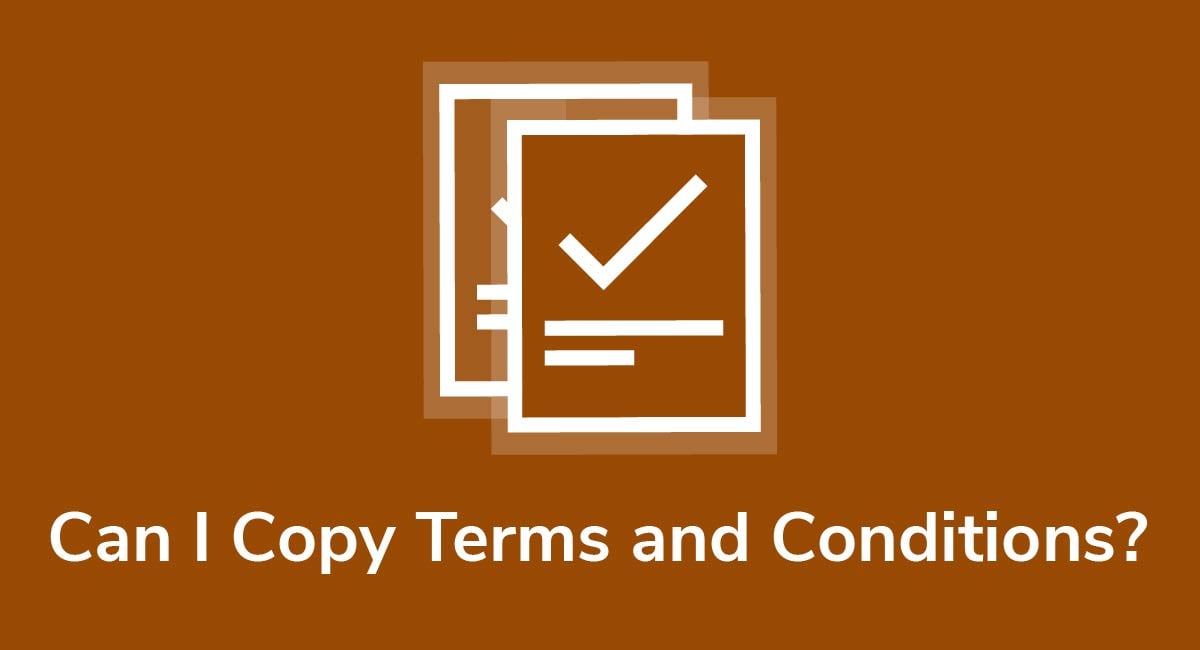
It's never a good idea to simply copy someone else's Terms and Conditions agreement and use it as your own. Not only could this be a copyright violation, but it could expose your business to unnecessary risks and even lawsuits down the line.
Below, we consider what Terms and Conditions are and provide seven reasons why you should think again before copying another company's agreement.
Need Terms and Conditions for your business? We can help you generate a customized Terms and Conditions agreement in around two-three minutes for free. Try our Terms and Conditions Generator and just follow these steps:
- Click on the "Create your Terms and Conditions today" button.
- At Step 1, select the where will you use your Terms & Conditions and click "Next step":
- Add information about your business:
- Select the country and continue to the "Next step":
- Answer the questions about your business practices and click "Next step" when finished:
-
Enter your email address where you'd like your agreement sent and click "Generate."

You're done! Now you'll be able to instantly access and download your new agreement.
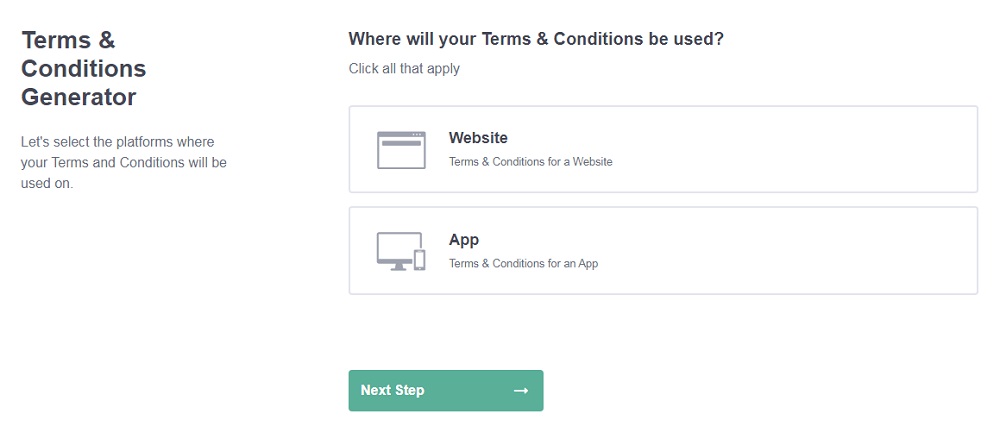
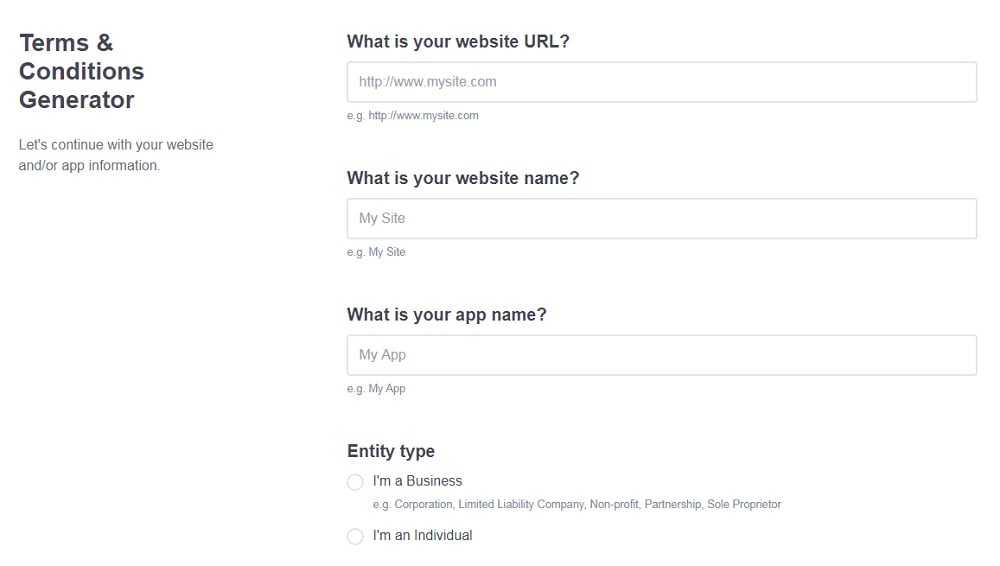
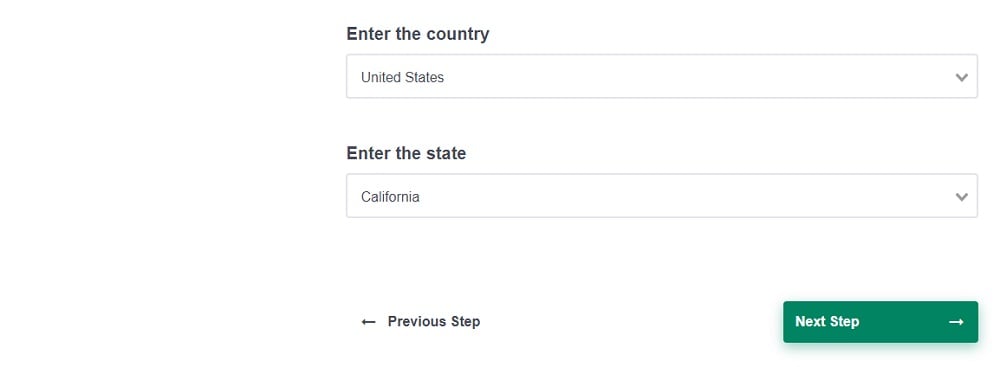
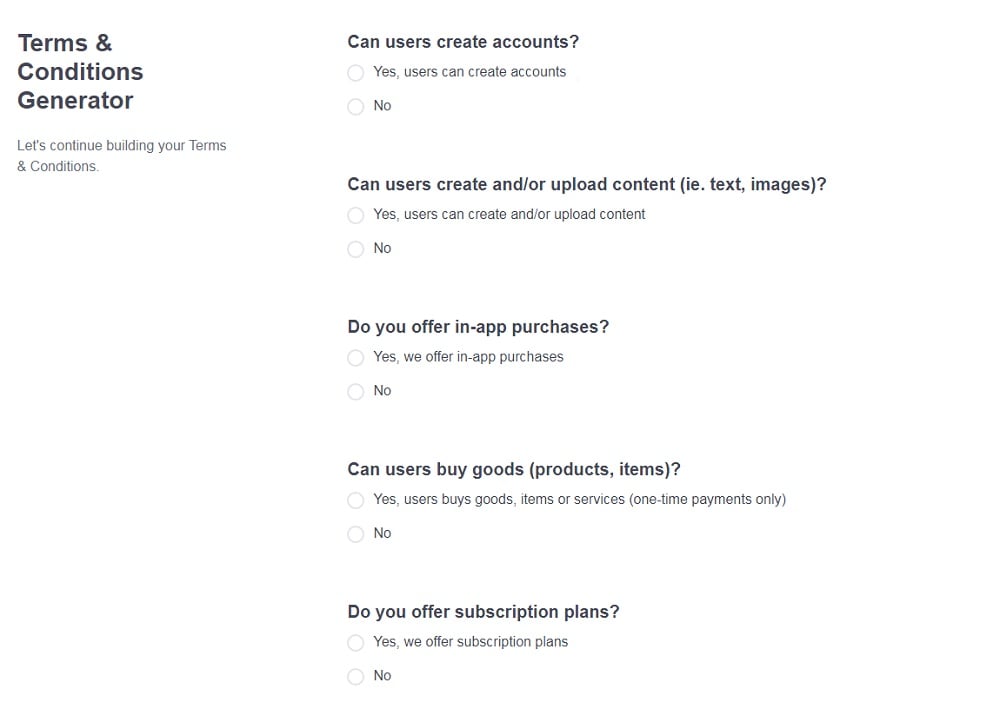
- 1. What are Terms and Conditions Agreements?
- 2. Why You Should Have Terms and Conditions
- 3. Similar Content vs Copying Terms and Conditions
- 4. 7 Reasons Why You Shouldn't Copy Terms and Conditions
- 4.1. 1. You Might Copy Legal Inaccuracies
- 4.2. 2. Copying Won't Protect Your Business
- 4.3. 3. Terms and Conditions are Your Chance to Build Your Reputation
- 4.4. 4. You Might Fail to Include Sector-Specific Provisions
- 4.5. 5. Generic Terms and Conditions Won't Address Your Business Needs
- 4.6. 6. You Risk Copyright Violations
- 4.6.1. Fair Use
- 4.7. 7. Reputation Damage Deters Investment
- 5. How to Write Your Own Terms and Conditions
- 5.1. Reference Existing Terms and Conditions
- 5.2. Use a Terms and Conditions Template or Generator
- 6. Summary
What are Terms and Conditions Agreements?
Terms and Conditions agreements are a binding legal agreement between your business and your end users. By using your services, your end users agree to follow the rules set out in the Terms and Conditions, and if they don't follow the rules, you can suspend or terminate their account.
Terms and Conditions may also be known as:
- Terms of Use
- User Agreement
- Terms of Service
So long as it's clear what the agreement is and what it covers, the name is less important than the content. For example, SEMRush calls its policy a "Terms of Service" while Etsy calls it a "Terms of Use."
Unlike documents like a Privacy Policy, Terms and Conditions are not legally required. That said, most websites have at least a short notice setting out some terms of service or conditions of use, and every business or blog can benefit from having this agreement in place.
Why You Should Have Terms and Conditions

There are a few reasons why it's worth having such an agreement in place:
- Although copyright laws protect your intellectual property (IP) from the moment of creation e.g. logos and blog posts, Terms and Conditions help make it easier to enforce your legal rights.
- Terms and Conditions set the rules you expect people to follow if they use your website or services. If someone breaks the rules, it's easier to close their account if there are Terms and Conditions in place.
- Your Terms and Conditions acts as a contract you can refer to if there's a dispute between you and a client or customer.
People expect your website to have a Terms and Conditions agreement. By providing this type of agreement, you're meeting the average consumer's expectations which may help you grow your business over time.
Similar Content vs Copying Terms and Conditions
If you read enough Terms and Conditions, you'll notice that every agreement is, at least superficially, very similar. They all include clauses covering, for example:
- Intellectual property rights
- Governing laws
- Account termination
- Limitation of liability
And, depending on the industry, there may be other clauses covering matters such as user generated content (UGC), subscriptions, and returns policies.
Given the sheer number of Terms and Conditions agreements out there, it's unsurprising that they might use similar words, phrases, and forms of expression. You might even recognise the same layout being used from agreement to agreement.
However, there's a difference between similarities and policies which are virtually the same.
7 Reasons Why You Shouldn't Copy Terms and Conditions

Here are seven reasons why copying Terms and Conditions should be avoided.
1. You Might Copy Legal Inaccuracies
There's no guarantee the Terms and Conditions agreements you see on other websites are legally accurate. One of the major risks of copying Terms and Conditions is that you could end up with an agreement that is wrong in some way. Here are some examples:
- The Terms and Conditions may be drafted to comply with old, outdated laws which have since changed.
- If the Terms and Conditions are for a different jurisdiction, they might not be compatible with your country's laws.
- Some clauses in the Terms and Conditions agreement may be misleading, unclear, or legally invalid.
In the worst case scenarios, the agreement might be deemed unfair or legally unenforceable, even if only one or two clauses are inaccurate. You could be left completely exposed to significant lawsuits in such cases.
2. Copying Won't Protect Your Business
If you just copy someone else's Terms and Conditions, there's a risk the document won't offer the protections your business needs.
You can rely on your Terms and Conditions if a dispute arises. For example, if something goes wrong with your goods or services, you want to fall back on your limitation of liability clause. Or, if you want to suspend a user's account, you should be able to rely on your Terms and Conditions to do so.
Without clauses tailored specifically to your industry, your business and your preferences, you may not address important areas that you would have otherwise.
3. Terms and Conditions are Your Chance to Build Your Reputation
Your brand's reputation is crucial to your company's long-term success. Original, unique Terms and Conditions can help you develop this reputation in two key ways:
- By setting your own terms, you can use language which reflects your brand voice. Using a consistent voice helps you build authenticity and showcase what makes your company unique.
- If you write your own Terms and Conditions, you can include favorable terms which set you apart from your competitors e.g. free returns or a longer than average return period that your customers will enjoy.
When you copy another business's Terms and Conditions agreement and you miss out on these opportunities to grow your brand.
4. You Might Fail to Include Sector-Specific Provisions
Every industry, be it technology, financial services, or otherwise, has specific challenges.
For example, Mayo Clinic, a health website, includes a "Not Medical Advice" clause so readers know they shouldn't rely on the information provided:
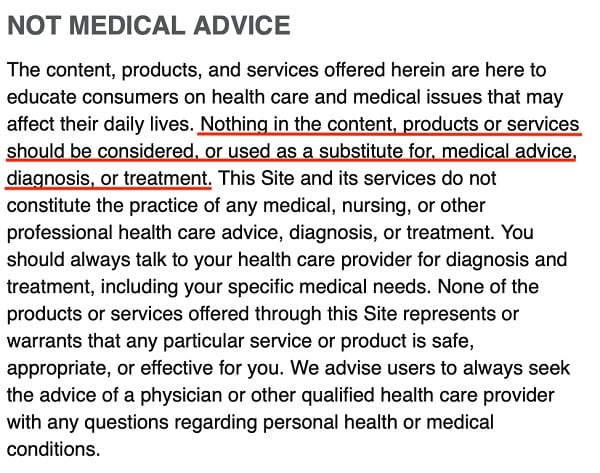
And law firm Alston & Bird has a disclaimer regarding attorney-client relationships:

If you copy Terms and Conditions, you risk leaving out these key clauses which you need to include to satisfy your specific industry requirements. You could be left with invalid Terms and Conditions you can't rely on or that don't offer enough specific protection.
5. Generic Terms and Conditions Won't Address Your Business Needs
Even if you try to copy Terms and Conditions from another business operating in the same industry, there's a simple reason why this approach could fail. No two businesses are the same.
Every company requires Terms and Conditions clauses tailored to its unique requirements.
Take eBay as an example. Since both buyers and sellers use the platform, the Terms and Conditions agreement includes clauses to address their specific needs. Clause 13, for example, addresses returns and cancellations for sellers:
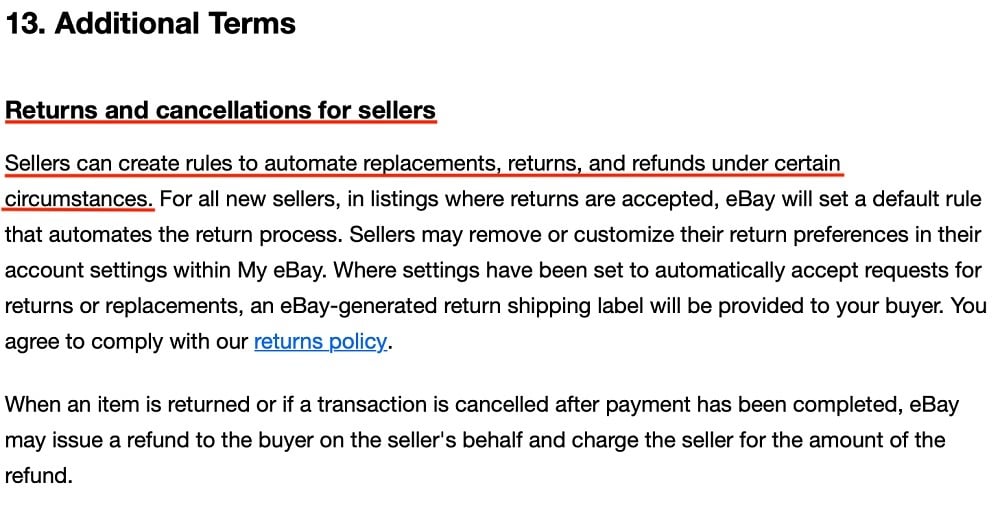
But if you're a small retailer, or your audience is buyers rather than sellers, such a clause isn't helpful to you. Your Terms and Conditions won't be relevant to your target audience if it has such a clause, which could make your business look unprofessional.
6. You Risk Copyright Violations
It's a potential copyright infringement to just lift someone else's Terms and Conditions and post them on your website. This is because copyright laws automatically protect any original written work, including a document like a Terms and Conditions agreement, from the moment of creation.
Most businesses use copyright disclaimers or notices of some kind to confirm their IP rights. Pinsent Masons, for example, asserts its copyright in its website footer:

It also has a copyright clause in its Terms and Conditions which sets out what you can't do e.g. copy or incorporate any part of the website without express permission.
However, even if there's no such notice available on a website you visit, the laws still apply. It's safer to assume the Terms and Conditions agreement is protected by copyright than to just copy it.
Fair Use
If you use copyrighted material in a transformative way and you don't try to declare yourself the author of the original work, you might be able to use some parts of a Terms and Conditions agreement. This stems from the U.S. doctrine of "fair use" which makes it possible to use some copyrighted material without permission.
For example, if you find one or two clauses which are perfect for your business and you make substantial changes to the language, you may be able to avoid copyright disputes by relying on the fair use doctrine. However, there's no guarantee the fair use doctrine will apply, and even if it does, there's still a chance the original creator will ask you to take the Terms and Conditions down.
Copyright infringement allegations can have serious consequences. Not only can they damage your reputation, but they can be costly to settle. Even if the lawsuit is ultimately dismissed, it's still an issue you might want to avoid.
Just because it's a legal document doesn't mean IP and copyright laws don't apply. Create your own Terms and Conditions to avoid potential copyright disputes.
7. Reputation Damage Deters Investment
If there's one thing you'll need to secure investment for your business, it's a professional reputation. The problem? Investors may be deterred from buying into your business if they have concerns about outstanding lawsuits or bad commercial practices.
For example, if another business owner sues you for alleged copyright violations, or you're embroiled in a customer dispute due to poorly-drafted Terms and Conditions, you might struggle to get the financial support you need to take your company to the next level.
You can give investors more confidence in your business and encourage existing stakeholders to stick around by operating in a transparent way.
Draft your own Terms and Conditions and use them as an opportunity to showcase what's original and unique about your business.
How to Write Your Own Terms and Conditions

While it clearly isn't recommended to copy another business's Terms, the good news is that there's no need to start at the beginning and create your Terms and Conditions from scratch and without any guidance.
Instead, you can take inspiration from existing Terms and Conditions agreements, reference a Terms and Conditions Template to help you get started, or you can use a free Terms and Conditions generator tool.
Reference Existing Terms and Conditions
Terms and Conditions are often similar from one business to the next, even if they're not exactly the same.
If you're in the same industry, there's no harm in using other similar Terms and Conditions as a guideline for how you might write your own notice.
However, the wording should not be identical and there should be no suggestion of copying.
Use a Terms and Conditions Template or Generator
A Terms and Conditions generator creates a bespoke user agreement for your business. They're easy to use and it only takes a few minutes to work through the steps. All you do is provide some basic information about your business, follow the onscreen instructions, and download a unique legal document which you can edit at any time.
A Terms and Conditions template is less automatic compared to a generator, but the template allows you to have a drafted document that you can fill in manually with your own details, preferences and content. They offer great flexibility and hands-on creation of your own legal agreement, with the structure already in place to help guide you along.
Summary
It's okay to use existing Terms and Conditions as guidance for writing your own document. However, you should avoid directly copying another company's Terms and Conditions or you may cause significant harm to your business.
- If you copy inaccurate or misleading clauses, you may be left with Terms and Conditions which are legally unenforceable.
- Relying on someone else's Terms and Conditions means you aren't customizing the terms to suit your own commercial needs.
- It's illegal to infringe another company's copyright or intellectual property. Copying Terms and Conditions may be considered copyright infringement.
- If you're facing lawsuits due to copyright violations or customers challenging your Terms and Conditions, you risk losing customers, money and potential investment opportunities.
There's nothing wrong with looking at how other businesses in your industry write their Terms and Conditions, but you must ensure that you write your own unique clauses so the terms fit your business needs.
If you're unsure how to draft Terms and Conditions, you can use a reliable generator or template to help you create a customized document.

